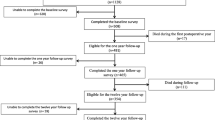Abstract
Background
An increasing proportion of patients undergoing coronary artery bypass grafting (CABG) are obese and are thought to carry a higher mortality and morbidity in association with surgery, but data on whether health-related quality of life (QOL) improves similarly after CABG in obese and non-obese patients are limited. We assessed in detail the effect of obesity on changes in health-related QOL (RAND-36 Health Survey) during the first year following CABG.
Methods
Comprehensive data on 508 CABG patients were prospectively collected. One hundred patients (19.7%) were categorized as obese (body mass index ≥ 30 kg/m2). The RAND-36 Health Survey was used as an indicator of quality of life. Assessments were made preoperatively and repeated 12 months later.
Results
The obese group fared significantly worse than the non-obese group with regard to the likelihood of superficial wound infection (19.0% versus 7.1%, P < 0.001), impaired renal function (31.7% versus 14.4%, P = 0.01), and required on average 2 days longer in hospital (P < 0.05). The incidence of mediastinitis was not significantly higher among the obese patients (2.0% versus 1.2%, P = 0.55), and they less frequently needed postoperative red cell transfusions (29.0% versus 44.9%, P = 0.004). The obese improved significantly (P < 0.001) in 7, and the non-obese (P < 0.001) in all 8 RAND-36 dimensions. Physical Component Summary and Mental Component Summary scores on the RAND-36 improved significantly (P < 0.001) in obese as well as in non-obese patients.
Conclusions
Although obese patients differ from non-obese patients in that they had inferior QOL before and in the year following CABG, they gain a similar improvement in QOL 1 year after surgery compared with non-obese patients. Excluding superficial wound infection, transient impaired renal function, and slightly longer hospital stay, obesity does not significantly increase the risk of other adverse outcomes during the first year following CABG.


Similar content being viewed by others
References
Lahti-Koski M, Pietinen P, Männistö S, et al. Trends in waist-to-hip ratio and its determinants in adults in Finland from 1987 to 1997. Am J Clin Nutr 2000;72:1436–1444
Lahti-Koski M. Body mass index and obesity among adults in Finland. Publications of the National Public Health Institute A12/2001, Helsinki, 2001
Lahti-Koski M, Vartiainen E, Männistö S, et al. Age, education and occupation as determinants of trends in body mass index in Finland from 1982–1997. Int J Obes 2000;24:1669–1676
Brandt M, Harder K, Walluscheck KP, et al. Severe obesity does not adversely affect perioperative mortality and morbidity in coronary artery bypass surgery. Eur J Cardiothorac Surg 2001;19:662–666
Orhan G, Bicer Y, Aka SA, et al. Coronary artery bypass graft operations can be performed safely in obese patients. Eur J Cardiothorac Surg 2004;25:212–217
Birkmeyer NJO, Charlesworth DC, Hernandez F, et al. Obesity and risk of adverse outcomes associated with coronary artery bypass surgery. Circulation 1998;97:1689–1694
Prabhakar G, Haan CK, Peterson ED, et al. The risk of moderate and extreme obesity for coronary artery bypass grafting outcomes: a study from the Society of Thoracic Surgeons’ database. Ann Thorac Surg 2002;74:1125–1131
Schwann TA, Habib RH, Zacharias A, et al. Effects of body size on operative, intermediate, and long-term outcomes after coronary artery bypass operation. Ann Thorac Surg 2001;71:521–531
Kuduvalli M, Grayson AD, Oo AY, et al. The effect of obesity on mid-term survival following coronary artery bypass surgery. Eur J Cardiothorac Surg 2003;23:368–373
Acinapura AJ, Jacobowitz IJ, Kramer MD, et al. Demographic changes in coronary artery bypass surgery and its effect on mortality and morbidity. Eur J Cardiothorac Surg 1990;4:175–181
Estafanous FG, Loop FD, Higgins TL, et al. Increased risk and decreased morbidity of coronary artery bypass grafting between 1986 and 1994. Ann Thorac Surg 1998;65:383–389
Järvinen O, Huhtala H, Laurikka J, et al. Higher age predicts adverse outcome and readmission after coronary artery bypass grafting. World J Surg 2003;27:1317–1322
Aalto A-M, Aro AR, Teperi J. RAND-36 as a measure of health-related quality of life. Reliability, construct validity and reference values in the Finnish general population (in Finnish with English summary). Helsinki: Stakes, Research Reports 101, 1999
Hays RD, Sherbourne CD, Mazel R. The RAND 36-item Health Survey 1.0. Health Econ 1993;2:217–277
Ware JE, Sherbourne CD. The MOS 36-item short-form health survey (SF-36). Medical Care 1992;30:473–481
Hays RD, Stewart AL. The structure of self-reported health in chronic disease patients. Psychological assessment. J Consult Clin Psychol 1990;58(2):22–30
Hays RD, Marshall GN, Wang EYI, et al. Four-year cross-lagged associations between physical and mental health in the medical outcome study. J Consult Clin Psychol 1994;62(3):441–449
Rumsfeld JS, Magid DJ, O’Brien M, et al. Changes in health-related quality of life following coronary artery bypass graft surgery. Ann Thorac Surg 2001;72:2026–2032
Obesity: prevention and management of the global epidemic. Report of a WHO consultation. Technical Report Series, 2000
Lindhout AH, Wouters CW, Noyez L. Influence of obesity on in-hospital and early mortality and morbidity after myocardial revascularization. Eur J Cardiothorac Surg 2004;26:535–541
Reeves BC, Ascione R, Chamberlain MH, et al. Effect of body mass index on early outcomes in patients undergoing coronary artery bypass surgery. J Am Coll Cardiol 2003;42:668–676
Charlier L, Dutrannois J, Kaufman L. The SF-36 questionnaire: a convenient way to assess quality of life in angina pectoris patients. Acta Cardiol 1997;3:247–260
Goldsmith IRA, Lip GYH, Patel RL. A prospective study of changes in the quality of life of patients following mitral valve repair and replacement. Eur J Cardiothorac Surg 2001;20:949–955
Järvinen O, Saarinen T, Julkunen J, et al. Changes in health-related quality of life and functional capacity following coronary artery bypass surgery. Eur J Cardiothorac Surg 2003;24:750–756
Järvinen O, Julkunen J, Saarinen T, et al. Effect of diabetes on outcome and changes in quality of life after coronary artery bypass grafting. Ann Thorac Surg 2005;79:819–824
Author information
Authors and Affiliations
Corresponding author
Rights and permissions
About this article
Cite this article
Järvinen, O., Julkunen, J. & Tarkka, M.R. Impact of Obesity on Outcome and Changes in Quality of Life After Coronary Artery Bypass Grafting. World J. Surg. 31, 318–325 (2007). https://doi.org/10.1007/s00268-006-0183-5
Published:
Issue Date:
DOI: https://doi.org/10.1007/s00268-006-0183-5




